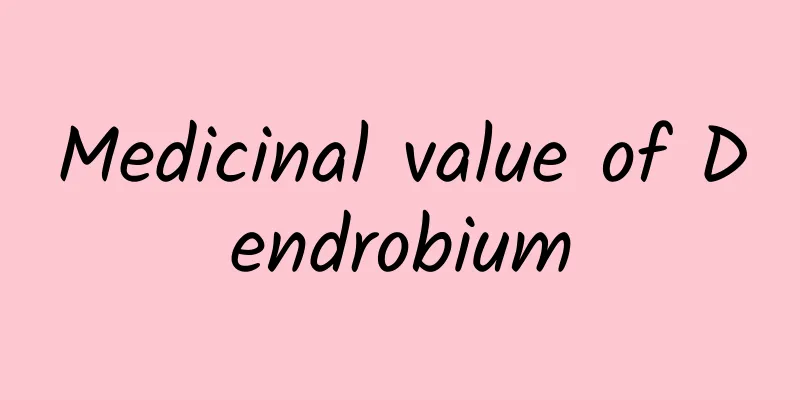Medicinal value of Dendrobium

|
Dendrobium has many medicinal values, but most people don’t know about them. Because in the daily life of most people, there are few opportunities to see Dendrobium, and many people don’t even know what Dendrobium is? In fact, Dendrobium is a kind of plant, but because Dendrobium has medicinal value, it can also be said to be a medicinal plant. Because of the distribution and living habits of Dendrobium, ordinary people cannot easily see Dendrobium. Although Dendrobium is a plant, it also has flowers. In addition to its medicinal value, Dendrobium also has high edible value. Therefore, people who are familiar with Dendrobium often eat it. At the same time, eating Dendrobium also has certain benefits for our body. So, let’s talk about the medicinal value of Dendrobium. Dendrobium composition Dendrobium officinale polysaccharide component: Polysaccharide component is the main active ingredient of Dendrobium officinale. Polysaccharide component can scavenge free radicals, has antioxidant activity, can regulate the body's immunity, prevent and treat sub-health, reduce the occurrence of diseases, inhibit tumors, and delay aging. Yang Hong et al. used sugar composition analysis, methylation analysis and other methods to study the structure of Dendrobium officinale polysaccharides, and isolated DT2 and DT3 for the first time, which mainly contain glucose, galactose, xylose and a small amount of arabinose and mannose. Amino acids and other ingredients: In addition to polysaccharides, Dendrobium officinale also contains 17 kinds of amino acids and various minerals such as Mg, Ca, Fe, Mn, and Zn. Amino acids can be connected by peptide bonds to form peptides and proteins, which are the basic components of living tissue cells; minerals also play an important role in the regulation of human physiological functions and the prevention and treatment of various diseases, and are essential nutrients for the human body. Medicinal value of Dendrobium 1. "Nourishing yin and promoting fluid production" has always been considered the greatest medicinal property of Dendrobium officinale. Doctors in all dynasties have used Dendrobium officinale to treat diseases for its function of "nourishing yin and promoting fluid production", because improving the symptoms of yin deficiency in the human body is mainly achieved through "nourishing yin and promoting fluid production". Modern medical research results show that dendrobium extracted from Dendrobium officinale has the effects of lowering blood pressure, protecting blood vessels, and relieving fever and pain. Therefore, Dendrobium officinale is more commonly used in clinical Chinese medicine, and can better demonstrate its unique medicinal value. 2. The application of medicinal dendrobium was recorded as early as in the "Shennong Bencao Jing" in the late Eastern Han Dynasty. The medicinal functions of dendrobium were recorded in many ancient Chinese medical works such as "Compendium of Materia Medica" and "Dictionary of Chinese Medicine". For thousands of years, there has been a legend among the people in the south that when a critically ill patient is on the verge of death, people will try every means to risk their lives to pick "magic grass" from the cliffs, feed its juice into the patient's mouth, and bring the patient back to life. Although this statement has its legendary color, it is recorded that there is indeed such a medicinal herb known as the "life-saving magic grass" among the people. Its scientific name is "Dendrobium officinale". Modern medical research authorities have also found that Dendrobium can indeed improve the body's immune function and enhance disease resistance. It is a rare and precious Chinese medicinal material, and its uses and value will surely be recognized and applied by more and more people. Through the detailed introduction above, we can understand the medicinal value of Dendrobium in detail. Dendrobium has many medicinal values, which are specifically reflected in: nourishing yin and promoting body fluid, lowering blood pressure, protecting blood vessels, relieving fever, relieving pain, enhancing human immunity, etc. Therefore, you may as well eat Dendrobium appropriately in your future life, you may get unexpected gains. |
<<: The difference between Panax notoginseng and Panax notoginseng
Recommend
The efficacy and function of silver orchid
Since Chinese medicine has fewer side effects, mo...
The efficacy and purchase method of wild Ganoderma lucidum
Ganoderma lucidum, as we all know, is a relativel...
Is it healthy to soak black wolfberry in boiling water?
Black wolfberry is a very common nourishing produ...
The efficacy and function of tree hair
Tree hair is something that many people are very ...
The efficacy and function of Frost Red Vine
Frost-red vine is one of the common traditional C...
The efficacy and function of Greater Galangal
Alpinia galanga can not only supplement the body&...
The benefits of drinking Morinda officinalis soaked in water
Morinda officinalis is a common Chinese medicinal...
Medical Device Review: The Wonderful Principle of Ventilators in the Fight against the New Coronavirus
Source: China Device Evaluation...
The efficacy and function of twisted sheath citronella
Cymbopogon truncatum is a kind of traditional Chi...
What kind of training do astronauts need to do in order to “take a few steps” in space?
At 21:35 on December 21, after about 7.5 hours of...
Drinking water with Eclipta prostrata
Eclipta prostrata, also known as ink thread grass...
What are the uses of Dogwood?
Cornus officinalis looks a bit like wolfberry. It...
Help! Why can’t I poop when I travel?
Planning and production Source: A Brief History A...
Gartner: Only 9% of U.S. consumers plan to increase spending during the 2023 holiday shopping season
According to a Gartner survey, only 9% of consume...
Latest warning! Guangzhou is facing the strongest "water splashing mode" this year, please be sure to take precautions
Latest warning! Guangzhou welcomes the heaviest r...









